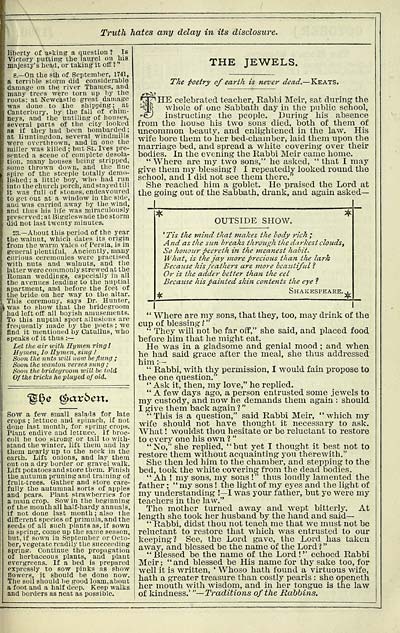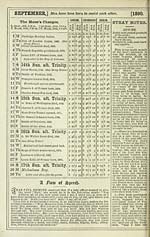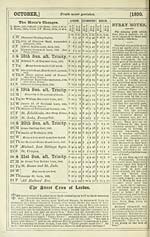Download files
Complete book:
Individual page:
Thumbnail gallery: Grid view | List view

Truth hates any delay in its disclosure.
liberty of asking a question ? Is
Victory putting the laurel on his
majesty's head, or taking it oft? "
8— On the 8th of September, 1741,
a terrible storm did considerable
damage on the river Thames, and
many trees were torn up by the
roots; at Newcastle great damage
was done to the shipping; at
Canterbury, by the fall of chim-
neys, and the untiling of houses,
several parts of the city looked
as if they had been bombarded ;
at Huntingdon, several windmills
were overthrown, and in one the
miller was killed; but St. Ives pre-
sented a scene of complete desola-
tion, many houses being stripped,
some thrown down, and the line
spire of the steeple totally demo-
lished; a little boy, who had run
into the church porch, and stayed till
it was full of stones, endeavoured
to get out at a window in the side,
and was carried away by the wind,
and thus his life was miraculously
preserved; at Biggleswade the storm
did not last twenty minutes.
23.— About this period of the year
the walnut, which dates its origin
from the warm vales of Persia, is in
general plentiful. Anciently, many
curious ceremonies were practised
with nuts and walnuts, and the
latter were commonly strewed at the
Roman weddings, especially in all
the avenues leading to the nuptial
apartment, and before the feet of
the bride on her way to the altar.
This ceremony, says Dr. Hunter,
k was to show that the bridegroom
had left off all boyish amusements.
To this nuptial sport allusions are
frequently made by the poets ; we
find it mentioned by Catullus, who
speaks of it thus : —
Let the air with Hymen ring!
Hymen, Io Hymen, sing !
Soon the nuts will now be flung ;
Soon the wanton verses sung ;
Soon the bridegroom will be told
Of the tricks he played of old.
Sow a few small salads for late
crops ; lettuce and spinach, if not
done last month, for spring crops.
Plant endive and lettuce. If broc-
coli be too strong or tall to with-
stand the winter, lift them and lay
them nearly up to the neck in the
earth. Lift onions, and lay them
out on a dry border or gravel walk.
Lift potatoes and store them. Finish
the autumn pruning and training of
fruit-trees. Gather and store care-
fully the autumnal sorts of apples
and pears. Plant strawberries for
a main crop. Sow in the beginning
of the month all half-hardy annuals,
if not done last month ; also the
different species of primula, and the
seeds of all such plants as, if sown
in spring, come up the same season,
but, if sown in September or Octo-
ber, vegetate readily the succeeding
spring. Continue the propagation
of herbaceous plants, and plant
evergreens. If a bed is prepared
expressly to sow pinks as show
flowers, it should be done now.
The soil should lie good loam, about
a foot and a half deep. Keep walks
and borders as neat as possible.
THE JEWELS.
The poetry of earth is never dead. — Keats.
fuTpHE celebrated teacher, Rabid Meir, sat during the
HfjN whole of one Sabbath day in the public school,
*eJ instructing the people. During his absence
from the house his two sons died, both of them of
uncommon beauty, and enlightened in the law. His
wife bore them to her bed-chamber, laid them upon the
marriage bed, and spread a white covering over, their
bodies. In the evening the Rabbi Meir came home.
" Where are my two sons," he asked, " that I may
give them my blessing ? I repeatedly looked round the
school, and I did not see them there."
She reached him a goblet. He praised the Lord at
the going out of the Sabbath, drank, and again asked—
*
OUTSIDE SHOW.
'Tis the mind that makes the body rich ;
And as the sun breaks throiigh the darkest clouds,
So houotir pecreth in the meanest habit.
What, is the jay more preciotis than the lark
Because his feathers are more beatttiful ?
Or is the adder better than the eel
Because his painted skin contents the eye ?
. Shakespeare.^
I I
" Where are my sons, that they, too, may drink of the
cup of blessing^"
" They will not be far off," she said, and placed food
before him that he might eat.
He was in a gladsome and genial mood ; and when
he had said grace after the meal, she thus addressed
him : —
" Rabbi, with thy permission, I would fain propose to
thee one question."
"Ask it, then, my love," he replied.
" A few days ago, a person entrusted some jewels to
my custody, and now he demands them again : should
I give them back again 1 "
"This is a question," said Rabbi Meir, "which my
wife should not have thought it necessary to ask.
What ! wouldst thou hesitate or be reluctant to restore
to every one his own ? "
"No," she replied, "but yet I thought it best not to
restore them without acquainting you therewith."
She then led him to the chamber, and stepping to the
bed, took the white covering from the dead bodies.
"Ah ! my sons, my sons !" thus loudly lamented the
father ; "my sons ! the light of my eyes and the light of
my understanding !— I was your father, but ye were my
teachers in the law."
The mother turned away and wept bitterly. At
length she took her husband by the hand and said —
" Rabbi, didst thou not teach me that we must not be
reluctant to restore that which was entrusted to our
keeping? See, the Lord gave, the Lord has taken
away, and blessed be the name of the Lord?"
"Blessed be the name of the Lord!" echoed Rabbi
Meir; "and blessed be His name for thy sake too, for
well it is written, ' Whoso hath found a virtuous wife,
hath a greater treasure than costly pearls : she openeth
her mouth with wisdom, and in her tongue is the law
of kindness.' "—Traditions of the Rabbins.
liberty of asking a question ? Is
Victory putting the laurel on his
majesty's head, or taking it oft? "
8— On the 8th of September, 1741,
a terrible storm did considerable
damage on the river Thames, and
many trees were torn up by the
roots; at Newcastle great damage
was done to the shipping; at
Canterbury, by the fall of chim-
neys, and the untiling of houses,
several parts of the city looked
as if they had been bombarded ;
at Huntingdon, several windmills
were overthrown, and in one the
miller was killed; but St. Ives pre-
sented a scene of complete desola-
tion, many houses being stripped,
some thrown down, and the line
spire of the steeple totally demo-
lished; a little boy, who had run
into the church porch, and stayed till
it was full of stones, endeavoured
to get out at a window in the side,
and was carried away by the wind,
and thus his life was miraculously
preserved; at Biggleswade the storm
did not last twenty minutes.
23.— About this period of the year
the walnut, which dates its origin
from the warm vales of Persia, is in
general plentiful. Anciently, many
curious ceremonies were practised
with nuts and walnuts, and the
latter were commonly strewed at the
Roman weddings, especially in all
the avenues leading to the nuptial
apartment, and before the feet of
the bride on her way to the altar.
This ceremony, says Dr. Hunter,
k was to show that the bridegroom
had left off all boyish amusements.
To this nuptial sport allusions are
frequently made by the poets ; we
find it mentioned by Catullus, who
speaks of it thus : —
Let the air with Hymen ring!
Hymen, Io Hymen, sing !
Soon the nuts will now be flung ;
Soon the wanton verses sung ;
Soon the bridegroom will be told
Of the tricks he played of old.
Sow a few small salads for late
crops ; lettuce and spinach, if not
done last month, for spring crops.
Plant endive and lettuce. If broc-
coli be too strong or tall to with-
stand the winter, lift them and lay
them nearly up to the neck in the
earth. Lift onions, and lay them
out on a dry border or gravel walk.
Lift potatoes and store them. Finish
the autumn pruning and training of
fruit-trees. Gather and store care-
fully the autumnal sorts of apples
and pears. Plant strawberries for
a main crop. Sow in the beginning
of the month all half-hardy annuals,
if not done last month ; also the
different species of primula, and the
seeds of all such plants as, if sown
in spring, come up the same season,
but, if sown in September or Octo-
ber, vegetate readily the succeeding
spring. Continue the propagation
of herbaceous plants, and plant
evergreens. If a bed is prepared
expressly to sow pinks as show
flowers, it should be done now.
The soil should lie good loam, about
a foot and a half deep. Keep walks
and borders as neat as possible.
THE JEWELS.
The poetry of earth is never dead. — Keats.
fuTpHE celebrated teacher, Rabid Meir, sat during the
HfjN whole of one Sabbath day in the public school,
*eJ instructing the people. During his absence
from the house his two sons died, both of them of
uncommon beauty, and enlightened in the law. His
wife bore them to her bed-chamber, laid them upon the
marriage bed, and spread a white covering over, their
bodies. In the evening the Rabbi Meir came home.
" Where are my two sons," he asked, " that I may
give them my blessing ? I repeatedly looked round the
school, and I did not see them there."
She reached him a goblet. He praised the Lord at
the going out of the Sabbath, drank, and again asked—
*
OUTSIDE SHOW.
'Tis the mind that makes the body rich ;
And as the sun breaks throiigh the darkest clouds,
So houotir pecreth in the meanest habit.
What, is the jay more preciotis than the lark
Because his feathers are more beatttiful ?
Or is the adder better than the eel
Because his painted skin contents the eye ?
. Shakespeare.^
I I
" Where are my sons, that they, too, may drink of the
cup of blessing^"
" They will not be far off," she said, and placed food
before him that he might eat.
He was in a gladsome and genial mood ; and when
he had said grace after the meal, she thus addressed
him : —
" Rabbi, with thy permission, I would fain propose to
thee one question."
"Ask it, then, my love," he replied.
" A few days ago, a person entrusted some jewels to
my custody, and now he demands them again : should
I give them back again 1 "
"This is a question," said Rabbi Meir, "which my
wife should not have thought it necessary to ask.
What ! wouldst thou hesitate or be reluctant to restore
to every one his own ? "
"No," she replied, "but yet I thought it best not to
restore them without acquainting you therewith."
She then led him to the chamber, and stepping to the
bed, took the white covering from the dead bodies.
"Ah ! my sons, my sons !" thus loudly lamented the
father ; "my sons ! the light of my eyes and the light of
my understanding !— I was your father, but ye were my
teachers in the law."
The mother turned away and wept bitterly. At
length she took her husband by the hand and said —
" Rabbi, didst thou not teach me that we must not be
reluctant to restore that which was entrusted to our
keeping? See, the Lord gave, the Lord has taken
away, and blessed be the name of the Lord?"
"Blessed be the name of the Lord!" echoed Rabbi
Meir; "and blessed be His name for thy sake too, for
well it is written, ' Whoso hath found a virtuous wife,
hath a greater treasure than costly pearls : she openeth
her mouth with wisdom, and in her tongue is the law
of kindness.' "—Traditions of the Rabbins.
Set display mode to: Large image | Transcription
Images and transcriptions on this page, including medium image downloads, may be used under the Creative Commons Attribution 4.0 International Licence unless otherwise stated. ![]()
| Scottish Post Office Directories > Towns > Dalkeith > Carment's … directory for Dalkeith and district > 1890 > (69) |
|---|
| Permanent URL | https://digital.nls.uk/86535602 |
|---|
| Description | Directories of individual Scottish towns and their suburbs. |
|---|
| Description | Around 700 Scottish directories published annually by the Post Office or private publishers between 1773 and 1911. Most of Scotland covered, with a focus on Edinburgh, Glasgow, Dundee and Aberdeen. Most volumes include a general directory (A-Z by surname), street directory (A-Z by street) and trade directory (A-Z by trade). |
|---|


